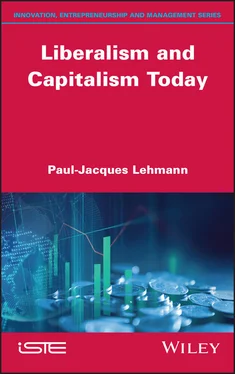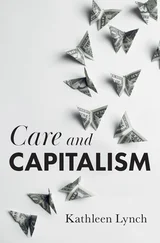Several other factors contributed to the expansion of some cities. For example, maritime cities became richer thanks to the conquest of overseas colonies and the installation of trading posts, allowing them to achieve a certain fiscal autonomy. What followed was the need to create rational rights, as opposed to supernatural ones, which were specific to the cities: market rights and trade police who controlled the quality of goods, monitored prices, ensured the maximum number of apprentices and companions of each master whose appointment was reserved for the sons of masters, prevented people outside the city from acquiring too decisive a role in existing companies and so on At the same time, an administration composed of specialized civil servants was set up.
For Weber (2019), it is thanks to the initiative of the bourgeoisie that capital exists. Indeed, they are “risk-takers, calculating and daring men at the same time, wise and greedy, who amass more than they spend, men above all sober and sure, perceptive men entirely devoted to their task, professing severe opinions and strict bourgeois principles […] They are neither adventurers nor upstarts. They are men who exist according to their enterprise and not the other way around. From the very beginning, the medieval bourgeois-citizen is much more homo oeconomicus than the one in the ancient city cannot or will not be. He abandons violence and weapons in politics for peaceful means in the search for the possibilities of gain available to him in the urban environment”.
The new inhabitants of the cities, traders and free craftsmen, would group together sociologically to form the class of the bourgeoisie, which would acquire economic power at the expense of the aristocracy, despite the privileges it retained. A rivalry then took hold between these two social classes and would not cease to grow as the influence of the bourgeoisie asserted itself. For example, in France, commoners gradually took the place of nobles, not only in the cities, where having been simple consumers they became merchants and then producers, but also in the countryside where they bought land and replaced former landowners.
As a result, the person who, as a representative of the state, had become the most important element, settling all the administrative and economic affairs of the territory on which they officiated, was no longer the nobleman, but the steward from the bourgeoisie, which allowed royal power to annihilate the influence of the great feudal lords.
1.3.4. … transforms into political power
These bourgeois, first merchants, then industrialists, were at the same time transformed into citizens taking over the administration of their common affairs. Indeed, as soon as they became rich, the inhabitants of the cities and the companies established there became more powerful politically than the local lords. They seized political power at the expense of the military elite in order to defend their cities. Weber (2019) argued that “the urban middle class has usurped a breach in seigniorial law and the economy was thus a continuation of the war by other means […] Throughout the Middle Ages, the city was the main support not only of the monetary economy, but also of the administration exercised by virtue of official duty, the first step towards the development of the rational state where the administration lost all personal dimension”.
Similarly, in The Old Regime and the Revolution , de Tocqueville (1856) wrote:
In the eighteenth century, all parochial business was transacted by who were not seigniorial, and who, instead of being chosen by the seigniors, were either appointed by the intendant of the province, or elected by the peasantry. It devolved upon these officers to distribute the taxes, to repair the churches, build schools, to convene and preside over parish meetings; to administer and superintend the expenditure of the funds of the commune ; to institute or answer, on behalf of the community, all necessary legal proceedings. The seignior had lost not only the management, but even the supervision of these petty local matters […] The seignior was in fact nothing more than a simple individual, isolated from his fellows by the enjoyment of peculiar immunities and privileges; his rank was different – his power no greater than theirs […] The French nobility persists in remaining apart from the other classes, and gentlemen end up allowing themselves to be exempted from most of the public burdens that weigh upon them. They figure that they will preserve their greatness by evading these charges, and it seems at first to be so. But soon an internal disease seems to have attached itself to their condition, which gradually reduces without anyone touching them, and they become poorer as their immunities increase. The bourgeoisie, with whom they had been so afraid of being confused, becomes richer on the contrary and becomes enlightened beside them, without them and against them: they had not wanted to have the bourgeoisie as partners nor as fellow citizens; they will find in them rivals, soon enemies, and finally masters.
However, this seizure of political power by the bourgeoisie would lead to economic disadvantages with the passing of laws that questioned the form of this nascent capitalism: encouragement of the formation of monopolies, sources of price increases and protectionism, an increase in public spending and therefore in taxes, and privileges granted to new beneficiaries. Moreover, quite rapidly, cities would lose their influence, both because the increase in the size of companies would force them to settle outside the cities, as the lords saw their incomes increase when they, in turn, became entrepreneurs, and because the cities of southern Europe were facing devastating competition.
We will have the opportunity to explain that, for Weber, this profound transformation went hand in hand with the appearance of Protestantism and the precepts that this religion inculcated in its followers.
1.4. The nascent authority of state bureaucracy
Weber was very interested in the concept of domination, which is one of the characteristics of any society. Ever since they were formed into groups, whatever their nature, people have been constantly tearing each other apart. In any human community, domination reflects the existence of the roles of the dominant and of the dominated. Weber explained that the dominated accept the orders of the dominant because of the consideration of the legitimacy of the latter. “The most decisive factor that determines obedience is the belief in the legitimacy of dominance”.
The Austrian author presented three forms of legitimate domination, which each stem from three causes. The first is charismatic: one follows the personality of a leader whose exceptional qualities are admired and who is obeyed according to the prestige they exercise over other people who show devotion to them, sometimes even to the point of sacrifice. The second is traditional: one obeys injunctions that one is accustomed to accept. The third is traditional-legal, regulatory and rational: one follows impersonal hierarchical orders.
Weber’s great contribution to this question was to analyze the transition of societies from an organization based on traditional legitimacy to societies where authority is imposed either by the influence of the charisma of individuals who exercise power, or through the exercise of reason which becomes the driving force of individual and collective action, by the process of rationalization of social activities, with people and societies being within the framework of this rationality, guided either by objectives or by values.
For a long time, domination was patrimonial. In modern capitalism, it was legal-rational domination with perfectly defined codes and rules that would impose itself in the hands of the state, allowing it to hold the monopoly of legitimate constraint under the influence of the bureaucracy whose meaning is difficult to define. Indeed, for many liberals, bureaucracy corresponds to the socialist ideal of socialism, whereas in reality, this notion seems to mean an attack on individual initiative. In any case, the people in charge of state bureaucracy saw the nature of their activities change. It must be determined whether the advantages of these new activities outweigh their disadvantages.
Читать дальше












